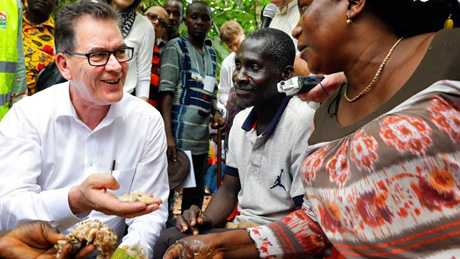BERLIN, Germany – Côte d’Ivoire is the world’s largest cocoa producer. In addition, the government is investing massively in coffee cultivation. Cocoa is the country’s most important export product, accounting for a share of 40 per cent.
As far as added value is concerned, however, very little reaches the farmers. Improving people’s living conditions on the plantations and ensuring that more processing takes place on the ground – these will be the focus themes of Germany’s Federal Minister for Economic Cooperation and Development Gerd Müller’s (PICTURE) visit to Côte d’Ivoire.
“Fair trade is key to development,” Federal Minister Müller said after visiting an UTZ-certified cocoa plantation.
“We cannot accept that hard-working cocoa and coffee farmers cannot make a living from their work and that children are forced to work like slaves on plantations instead of going to school.
By ensuring higher standards and wages under German development cooperation we can give the people on the ground a viable future.
If we want to be successful here, we need to see to it that more processing takes place in the country, that young people get the training that is needed and that we consistently reduce the EU’s trade barriers. That is what modern, future-oriented policy with Africa is all about.”
Cocoa farmers in Côte d’Ivoire earn so little that they have a mere 50 cents per day per family member. Only forty per cent of the cocoa produced is certified. For coffee, that figure is even only ten per cent.
Child labour continues to be a problem in the country. ILO estimates that 1.4 million children work on plantations in Côte d’Ivoire. For chocolate from conventional production only seven per cent of the value added remains with the producers. For fair trade chocolate it is twice as much.
Through their joint initiative PRO-PLANTEURS the Government of Côte d’Ivoire and the German Initiative on Sustainable Cocoa (a forum supported by the German government, the German confectionery industry, food retail sector and civil society) seek to improve the working conditions on the plantations.
The aim is to put an end to child labour and achieve higher incomes. 20,000 family farms and their organisations benefit from trainings on raising the quality in cocoa production.
“We want to use the lessons learned in cocoa production to make coffee production fair, too,” Minister Müller said. “Let me say clearly, coffee made with child labour doesn’t belong in our cups.”
That is why the German Development Ministry is launching a new initiative in cooperation with the Global Coffee Platform.
The aim is to ensure that one hundred per cent of the coffee consumed in Germany is from sustainable production – this is to include the entire supply chain from the plantation all the way to the consumer.
This initiative under German development policy is intended to protect valuable eco systems, stop deforestation, put an end to child labour and ensure labour rights and minimum wages.
Also on the agenda of Minister Müller’s journey are a visit to the only chocolate factory in West Africa, in Abidjan, and meetings with the African Development Bank and President Alassane Ouattara.
The Minister will present his ideas for a Marshall Plan with Africa at these meetings.


















